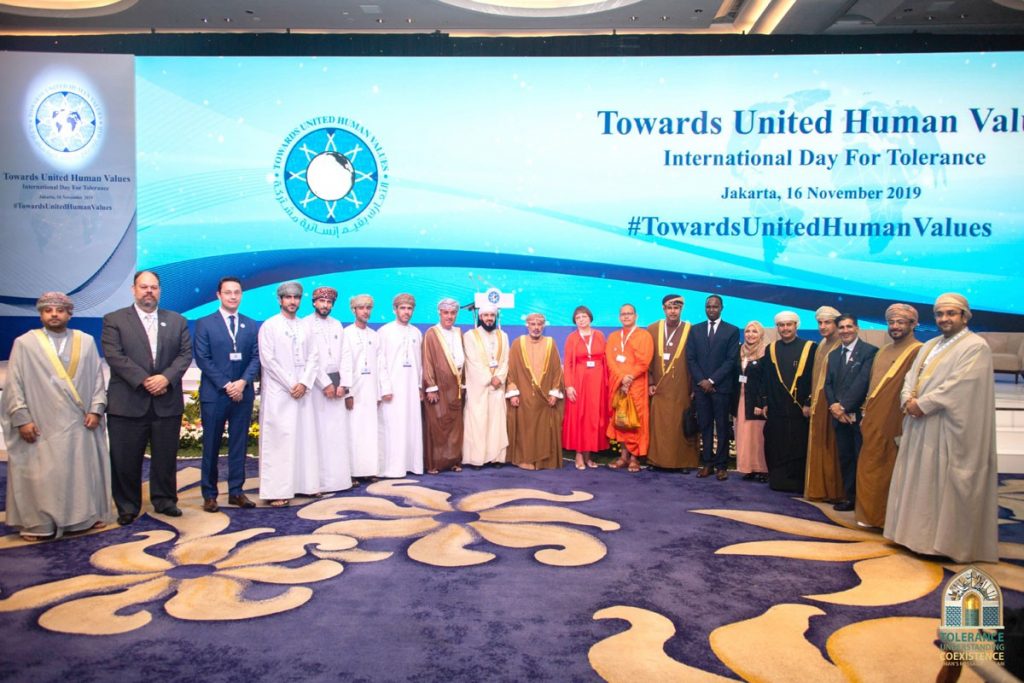
Oman recently launched a major initiative, “Towards United Human Values”, to promote religious tolerance, mutual understanding and peaceful coexistence in Jakarta, Indonesia.
The initiative, which is also known as the Sultan Qaboos Declaration Project on United Human Values, was launched by Oman’s Minister of Endowments and Religious Affairs Sheikh Abdullah Bin Mohammed Al Salmi at a celebration to mark the International Day for Tolerance in Jakarta.
Oman’s Sultan, Qaboos Bin Said Al Said, issued directives to spread the concepts of mutual understanding, religious tolerance and peaceful coexistence to foster human relations through this new initiative around the world. With a population of around 5 million, Oman is an ideal place for mutual understanding, peace and tolerance. This Muslim-majority country has a multicultural society in which people from different religions and cultures live in harmony. “It is strategically well-placed to spearhead a new national drive for religious understanding. Geographically, Oman’s near neighbours include both Sunni and Shiite heartland [“¦] For thousands of years, Omanis have traded in peace with other cultures,” said advisor to Oman’s Endowment and Religious Affairs Minister, Mohammed Said Al-Mamari.
The Oman initiative is very timely given the present turmoil in the world, which has emanated from hatred, terrorism and misinterpretation of teachings of various religions. Oman’s initiative calls for transcendence over rhetoric by proposing a method of action for a balanced life, in which people live on the basis of dignity, fundamental rights and psychological security. Oman’s Ministry of Endowments and Religious Affairs says there are three steps to reach this strategic target. The first step in rebalancing interests is to achieve a universal agreement on the goals to improve people’s lives; to achieve a basic level of dignity and rights, and to preserve human cohesion against annihilation and extinction. The second step is to adopt a global system of ethics which promotes mutual understanding and peaceful coexistence, and to motivate people to unite in their efforts toward the protection of the environment. Religious, cultural and ideological differences do not prevent, and are not an obstacle to, our ability to share common ground and values. The third step focuses on the need to instill or revive spiritual values in mankind and reconcile them with the evolution of reason. The main focus of these three steps will be on a human civilizational trilogy to achieve peaceful coexistence and acceptance among human beings, represented by the intellect, justice and morality.
The ministry says the intellect is all about honouring human beings, which calls on people to respect their mutual humanity and reject all forms of discrimination, extremism, violence and hatred. Justice is about the balancing of basic human rights in soul, society and living and benefiting from it. As far as ethics is concerned, it is the sum of human values, especially those of spiritual and philosophical dimension.
According to the ministry, these three directives diverge from the natural classifications and differences between people such as religion, language and culture. But the focus is on the united values, which form the core of the Omani initiative.
Why Indonesia?
Indonesia, home to the world’s biggest Muslim population, is well known as a land of tolerance. “Indonesia is the land of Pancasila. That is why we chose Indonesia to launch the Oman initiative and celebrate the International Day of Tolerance in Jakarta,” says Ambassador of Oman to Indonesia SayyidNazar Al Julanda Bin Majid Al Said. Pancasila is Indonesia’s state ideology based on five important principles. The five principles are faith in God, humanity, unity, democracy and social justice. Further, Pancasila embraces diversity and plurality of ethnicity, culture and faith.
(Extracted from thejaratapost.com)

COMMENTS